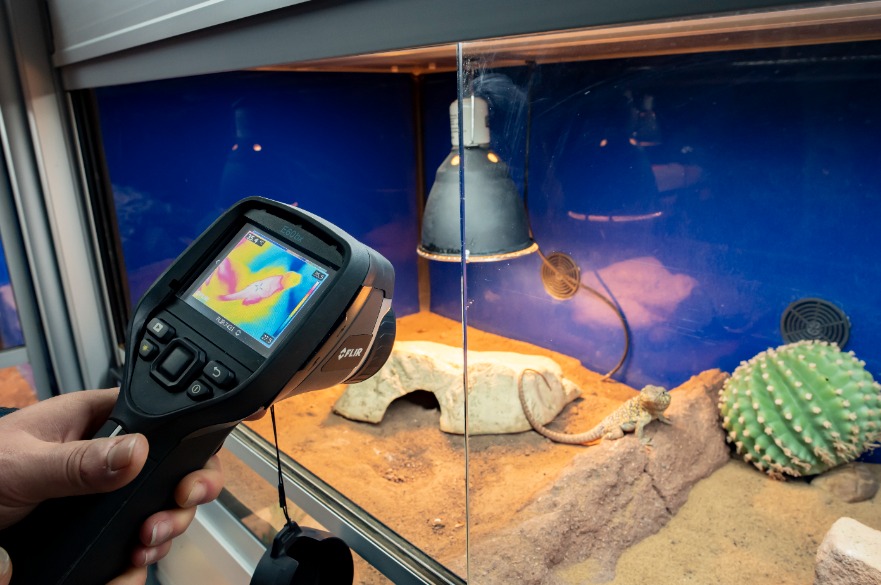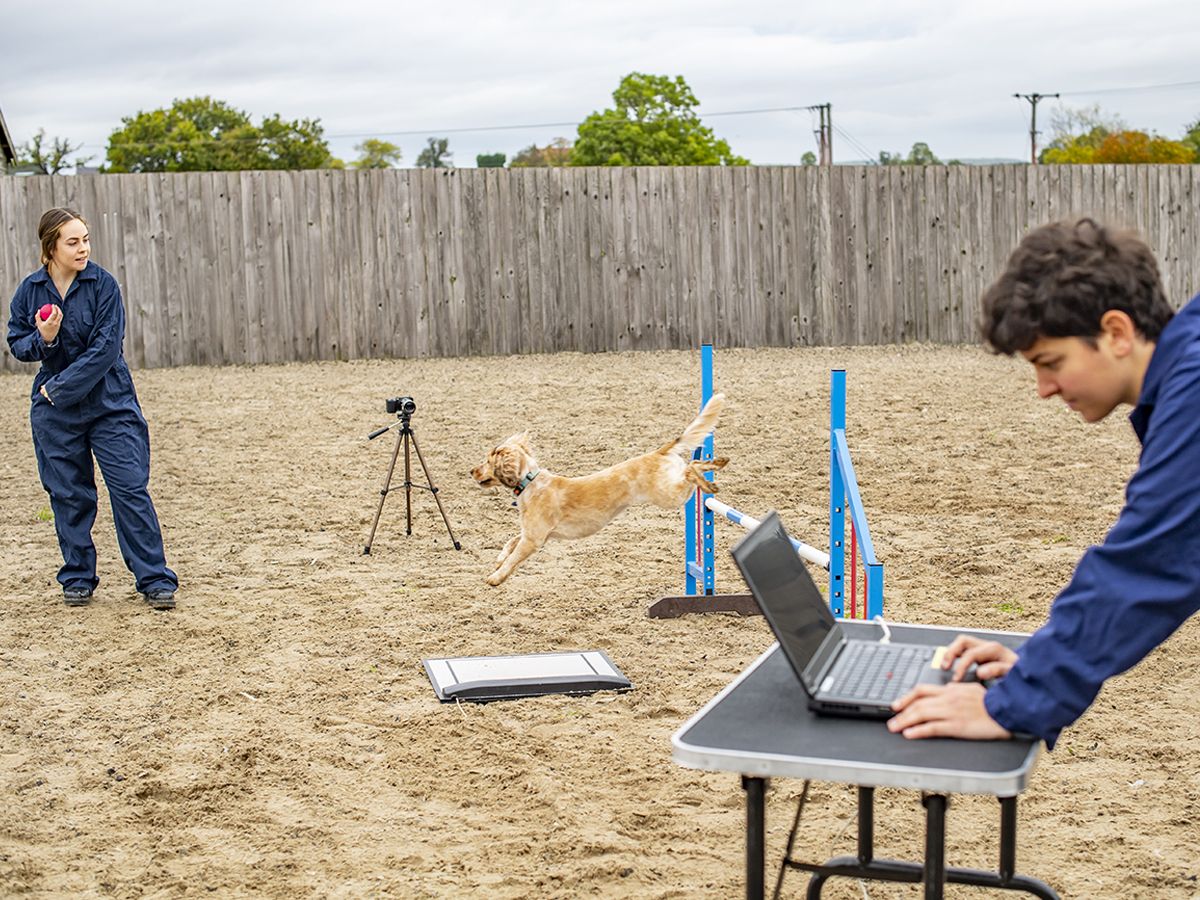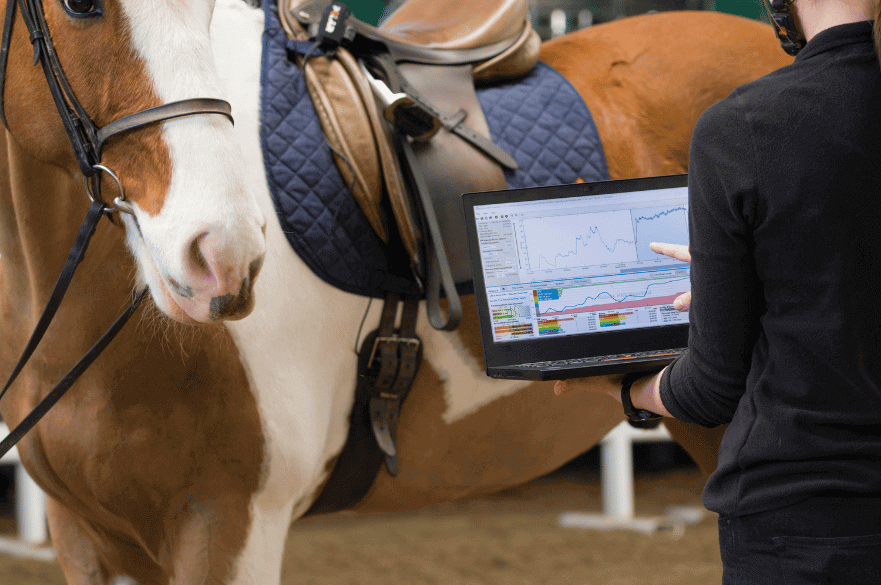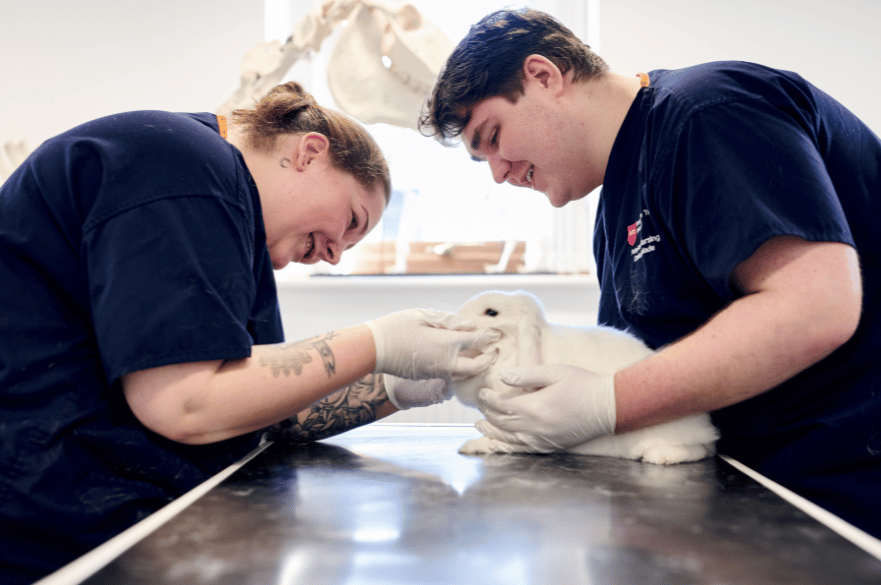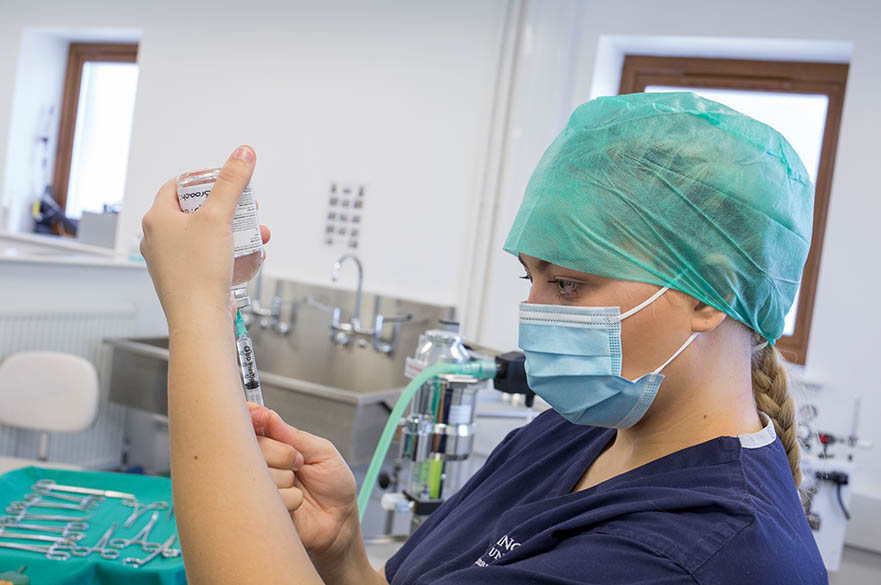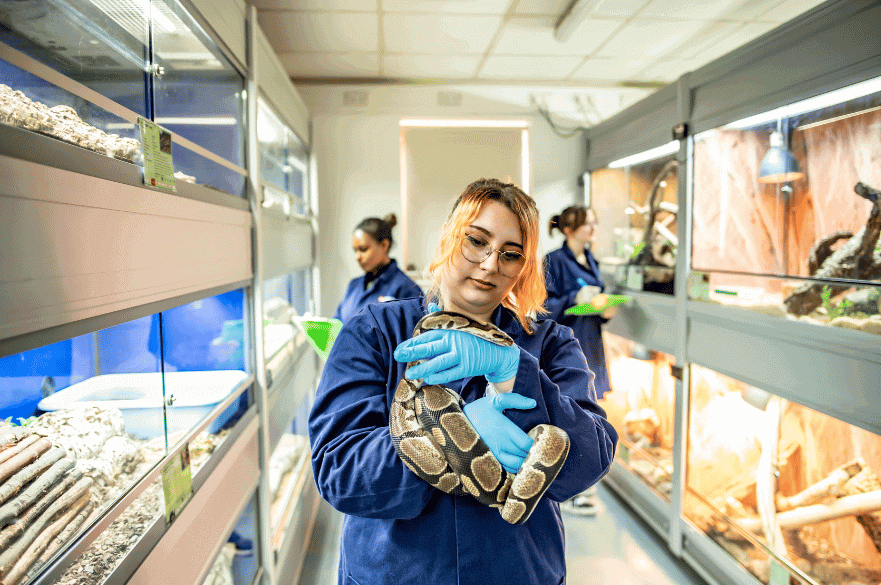Beat the Clearing queue
About this course
Do you have a passion for the animal kingdom and a burning curiosity about the diverse creatures that inhabit our planet? This course will nurture your interests and provide you with the fundamental skills and knowledge to pursue a vast range of careers.
Studying on our idyllic Brackenhurst Campus, this highly practical degree is packed with field trips, laboratory work, interactive sessions and opportunities to ignite your passions. You won’t have to go far to apply your knowledge as Brackenhurst acts as an outdoor classroom. From hedgerows to woodlands, and ponds to freshwater streams, there is endless scope to learn and develop.
Zoology is a broad discipline that allows you to delve deeper into physiology, genetics, evolution, ecology, animal behaviour and much more. It really is an undergraduate degree like no other. Share your enthusiasm with likeminded students and admire the passion that your lecturers have for the subject. The course is built to ensure you leave NTU with a widely recognised science degree. You won’t just graduate with a qualification; you’ll unlock opportunities to exciting careers in environmental consultancy, research laboratories, education, wildlife management, science communication and more.
Which course is right for you?
We offer three animal science degrees, each with a different focus:
- BSc (Hons) Zoology (this course) / BSc (Hons) Zoology (with foundation year) - covers a diverse range of invertebrate and vertebrate species in relation to their biology, evolution, taxonomy and identification.
- BSc (Hons) Animal Biology / BSc (Hons) Animal Biology (with foundation year) - focuses on managed domestic species such as companion, working and farm animals.
- BSc (Hons) Zoo Biology / BSc (Hons) Zoo Biology (with foundation year) - focuses on captive housed zoo animals and exotic species.
We also offer BSc (Hons) Wildlife Conservation / BSc (Hons) Wildlife Conservation (with foundation year).
What you’ll study
Studying Zoology at NTU guarantees a well-rounded science graduate. You will explore different groups of animals, classification, identification and taxonomy. With experts as teachers, you will also learn to manage and handle taxonomic data and apply your findings to the broader issues of conservation. You will become a force for change.
Your final year studying Zoology will allow you to take the reins to your own destiny. The course culminates in a dissertation: an independent research project that you choose, that reflects your interests. The modules have been carefully selected to enhance your career aspirations and ambitions.
Whatever your preferred route, you will have a plethora of opportunities to build connections within industry, apply your knowledge to the real world, and absorb expertise from your tutors who have a genuine interest in your future.
Here’s a detailed, year-by-year breakdown of the modules you’ll study:
Animal Behaviour (20 credits)
Study patterns of behaviour and the reasons why animals behave as they do in managed housing systems.
Animal Reproduction and Genetics (20 credits)
Learn the underpinning principles of animal genetics and how these link with reproductive physiology. Practical sessions will investigate assisted reproductive technologies and how these increase an animal’s reproductive success in captivity.
Animal Physiology (20 credits)
Study the fundamental biological systems of animals, and how these work together to maintain homeostasis. Explore cell physiology, principles of anatomy and physiology and the physiological systems of a broad range of animal species
Pathogen Biology (20 credits)
Learn about the biology of the different microorganisms and common pathogens in animals. This module will mix practicals and theory to establish pathogen classification, structure and reproduction.
Principles of Ecology (20 credits)
Study the interaction of biotic (living) and abiotic (non-living) factors in relation to the distribution of populations and communities within ecosystems.
Fundamentals of Taxonomy (20 credits)
Study the principles of taxonomy and evolution and develop the skills needed to identify extant animal species across a range of familiar and some unfamiliar taxa. You will also be introduced to ethical, legal and sustainability concepts relevant to zoology.
Physiology of Behaviour (20 credits)
Explore the way in which animals behave in relation to their environment. Learn and understand key areas of mammalian physiology and pharmacology, and how this relates to behaviour.
Introduction to Research (20 credits)
Explore the principles of research methods in biological sciences, focusing on data collection, analysis, and interpretation. You'll look at experimental design, literature evaluation and hypothesis testing, preparing you for undertaking independent research as part of your final year dissertation.
Vertebrate Zoology (20 credits)
Explore, from an evolutionary perspective, the biology of a range of chordate and vertebrate taxa. You will analyse the factors that have driven evolution and extinction, and engage in discussion of the evolutionary processes, phylogeny and the science (including genetics) used to investigate these concepts.
Invertebrate Zoology (20 credits)
You will evaluate, through a series of lab and fieldtrip based practical exercises, the form and function of a wide range of terrestrial and aquatic invertebrate species and their adaptations to the environment. Investigate the effectiveness of these adaptations for survival and the mechanisms involved in their evolution and the phylogenetic tracing of this.
Biology of Host Parasite Relationships (20 credits)
Become immersed in the fascinating and sometimes gruesome world of parasites. Parasites have evolved diverse and complex mechanisms in order to successfully parasitise their hosts and to adapt to both the micro and macro habitats that they inhabit. Within this module you will investigate these relationships and explore the evolutionary processes that have led to them, alongside further development of classification and reflective skills.
Zoological Specimens and Collections (20 credits)
Through a range of non-residential field trips, develop your skills and knowledge relating to the sampling, identification and preservation of zoological specimens.
This is a placement year for students on the four-year course
Dissertation (40 credits)
You will undertake an independent research project. This is an opportunity to take an in-depth look at a subject of personal interest to you within the field of zoology.
Zoology in the Field (20 credits)
You will attend a residential field course as a major part of this module. The module brings together the skills and knowledge gained throughout the course and supports you in applying these concepts and skills within the context of field work. You will further develop your ability to apply reflective practice, provide feedback, collaborate and think critically.
Animal Cognition and Behaviour (20 credits)
Apply zoological concepts studied during the first and second year (behaviour, physiology, genetics, evolution and phylogeny) to investigate contemporary issues within animal behaviour and cognition across a range of invertebrate and vertebrate taxa, including humans. Active collaborative learning will support you in developing your critical thinking, communication and feedback skills.
Zoology Applications and Advances (20 credits)
Integrate the knowledge and skills gained in earlier stages of the course and explore their applications within industry and research. Both well established and contemporary applications of the zoological sciences (e.g. genetics, physiology, taxonomy, ecology and behaviour) will be explored using a collaborative learning and solutions-based approach. Further develop essential graduate skills such as critical thinking and problem-solving.
You'll also choose one optional module:
Anthrozoology (20 credits)
Explore all facets of human-animal interaction, including implications on wild animal behaviour and conservation, the use of zoo animal ambassadors, human-animal relationships and the human-animal bond.
Aquatic Zoology (20 credits)
Discuss and evaluate a range of issues such as overfishing, climate change, and pollution, including current focuses on noise pollution, microplastics, agricultural runoff, and endocrine-disruptors. Learning is supported by fieldwork that allows students to engage with aquatic environments and the anthropogenic and community factors that influence them.
We regularly review and update our course content based on student and employer feedback, ensuring that all of our courses remain current and relevant. This may result in changes to module content or module availability in future years.
Don’t just take our word for it, hear from our students themselves
Student Work
Video Gallery
How you're taught
We understand that everyone learns differently so we have designed the course to accommodate your strengths. With a combination of interactive team-based learning, workshops, lectures, seminars, laboratory work and fieldwork on our rural campus, you’ll develop core skills to work with a variety of stakeholders in the professional world. Not only will you learn differently, but you’ll be also assessed differently too. We don’t stick to traditional methods; we keep our assessments relevant and up to date with the industry. From video-based assessments to the creation of posters, from field research notebooks to presentations, you will learn lifelong skills.
Our students love the interactive element of the course. You will regularly engage with others like yourself and be encouraged to express thought-provoking insights with your tutors. This course isn’t just about gaining knowledge, you will become an individual that understands and appreciates different perspectives.
If you choose to complete a placement, you’ll take it between year 2 and year 3 of study.
As a student at Brackenhurst Campus, you will have access to state-of-the-art facilities, including our laboratories and our Animal Unit, to complement your studies. Housing over 250 animals of more than 70 species, you’ll study a diverse range of animals, including reptiles, birds, fish, and mammals, large and small. A truly unique opportunity right on your doorstep.
Please note that field trip locations may vary and are subject to availability and change.
Careers and employability
Your future career
A degree in zoology provides you with a widely recognised science qualification, in addition to a range of highly valuable transferable skills. It is common for students to continue their studies in a further degree or research.
Your potential areas for employment include:
- environmental consultancy
- government agencies
- research laboratories
- museums
- field science and conservation agencies
- data analysis
- science communications across a variety of media
- graduate schemes, particularly those directed at science graduates
- further study at MSc and/or PhD level
- research and academia.
Placement opportunities
We will support you to undertake work experience opportunities throughout your course. You can also take an optional placement year. We have links with zoos and safari parks, nature reserves, animal research organisations and conservation groups across the UK and internationally.
NTU Enterprise
You'll also have the opportunity to turn your ideas into a viable business with help from NTU Enterprise, NTU's purpose-built Centre for Entrepreneurship and Enterprise, a support centre to help students create, develop and grow their own businesses.
Campus and facilities
As a dedicated home for our animal, rural and environmental science courses, the Brackenhurst Campus has a character all of its own. From the population of almost 2,000 students and staff to the animals themselves — cats and cattle, sheep and horses — it’s all about community. Relax with a coffee in the Orangery; kick back with your coursemates in the Brack Bar; enjoy the peace and quiet of our Victorian walled garden or Eco-Library; grab a pal and wander through 500 acres of stunning countryside.
During this course, your theoretical studies will be complemented by the use of our specialist Animal Unit. Housing over 250 animals and more than 70 species, you'll get the opportunity to study a diverse range of animals, reptiles, birds, fish and other small animals, as well as larger animals including donkeys, horses and goats.
Our Brackenhurst Campus sits on the doorstep of Southwell: a picture-perfect market town filled with rustic pubs, cosy cafés, and boutique shops. A little further afield, and served by reliable buses that run late into the night, you’ve got Nottingham — one of Britain’s top 10 student cities, and one of Europe’s top 25. It’s stuffed with history, culture, and well-kept secrets to discover at your leisure: enjoy lush green spaces, galleries, hidden cinemas and vintage shopping by day, and an acclaimed food, drink and social scene by night.
Volunteering
Why not broaden your horizons and give something back by taking part in our Animal Unit’s successful volunteer programme?
The animal unit volunteer programme is an extra-curricular opportunity open to all students at Nottingham Trent University. You’ll get the chance to work closely with our qualified and skilled team of technicians on a variety of tasks such as maintenance, health checks, medical administration and behaviour management such as enrichment and training.
These sessions are recognised and verified by the Higher Education Achievement Report (HEAR) to support your CV and boost your employability.
Entry requirements
UK students
Standard offer: 112 UCAS Tariff points from up to four qualifications, including A-level Biology grade C or equivalent.
Contextual offer: 104 UCAS Tariff points from up to four qualifications, including A-level Biology grade C or equivalent.
For this course we also consider Biology modules as part of BTECs and other qualifications.
To find out what qualifications have tariff points, please use our tariff calculator.
Additional requirements for UK students
Access to Higher Education courses
If you’re aged 19+ and don’t have the qualifications to meet the entry criteria, you can study an Access to HE course right here at NTU. These one-year courses are designed specifically as an alternative route to university.
Contextual offers
If you don’t quite meet our entry requirements, we might be able to make you a lower offer based on a range of factors, including your background (such as where you live and the school or college you attended), your experiences and your individual circumstances (you may have been in care, for example). This is called a contextual offer, and we get data from UCAS to help make these decisions. We do this because we believe everyone with the potential to succeed at NTU should have the opportunity to do so, no matter what barriers you may face.
Meeting our entry requirements
Hundreds of qualifications in the UK have UCAS Tariff points attached to specific grades, including A-levels, BTECs, T Levels and many more. You can use your grades and points from up to four different qualifications to meet our criteria. Enter your predicted or achieved grades into our Tariff calculator to find out how many points your qualifications are worth.
Other qualifications and experience
NTU welcomes applications from students with non-standard qualifications and learning backgrounds, either for year one entry or for advanced standing beyond the start of a course into year 2 or beyond.
We consider study and/or credit achieved from a similar course at another institution (otherwise known as credit transfer), vocational and professional qualifications, and broader work or life experience.
Our Recognition of Prior Learning and Credit Transfer Policy outlines the process and options available for this route. If you wish to apply via Recognition of Prior Learning, please contact the central Admissions and Enquiries Team who will be able to support you through the process.
Getting in touch
If you need more help or information, get in touch through our enquiry form.
International students
Academic entry requirements: 112 UCAS Tariff points from up to four qualifications, including A-level Biology grade C or equivalent.
Please note we also consider Biology modules as part of BTECs and other qualifications.
We accept equivalent qualifications from all over the world. Please check your international entry requirements by country.
English language requirements: See our English language requirements page for requirements for your subject and information on alternative tests and Pre-sessional English.
Additional requirements for international students
If you need help achieving the academic entry requirements, we offer a Foundation preparation course for this degree. The course is offered through our partner Nottingham Trent International College (NTIC) based on our City campus.
English language requirements
View our English language requirements for all courses, including alternative English language tests and country qualifications accepted by the University.
If you need help achieving the language requirements, we offer a Pre-Sessional English for Academic Purposes course on our City campus which is an intensive preparation course for academic study at NTU.
Other qualifications and experience
If you have the right level of qualifications, you may be able to start your Bachelors degree at NTU in year 2 or year 3. This is called ‘advanced standing’ entry and is decided on a case-by case basis after our assessment of your qualifications and experience.
You can view our Recognition of Prior Learning and Credit Transfer Policy which outlines the process and options available, such as recognising experiential learning and credit transfer.
Sign up for emails
Sign up to receive regular emails from the International Office. You'll hear about our news, scholarships and any upcoming events in your country with our expert regional teams.
Getting in touch
If you need advice about studying at NTU as an international student or how to apply, our international webpages are a great place to start. If you have any questions about your study options, your international qualifications, experience, grades or other results, please get in touch through our enquiry form. Our international teams are highly experienced in answering queries from students all over the world.
Policies
We strive to make our admissions procedures as fair and clear as possible. To find out more about how we make offers, visit our admissions policies page.
